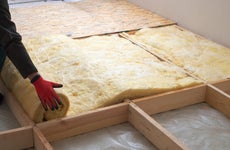
Portfolio mortgages: What they are and how they work
If you don’t meet traditional loan criteria, they could be the answer. Beware the fine print, though.
Your home isn’t just a place to live — it’s often the single most valuable asset you own. So it’s important to know how to maintain it and invest in it, preserving and even increasing its worth. Take care of it, and it can work for you.
— Troy Segal
Troy Segal is Senior Editor, Home Lending for Bankrate. She handles topics relating to the physical and financial health of homes, from upkeep and maintenance to building equity and enhancing value. She also edits stories on the finer points of mortgages and home equity loans.
Troy first became interested in money matters at her mother’s knee—as her mother researched Treasury bond interest rates in the business pages of the newspaper. She grew up to become a staff editor at Business Week for six years, where she created a personal finance section, alternating money and wealth management with real estate and home renovation topics. Later, as Social Issues editor, she oversaw cover stories on education, healthcare, and workplace diversity.
Throughout her 30-year career, she has also written and edited articles about investments, taxes, banking, real estate and other financial subjects for Investopedia, Business Insider, Worth, and Entrepreneur. On the lighter lifestyle side, Troy's experience includes covering dining and theater (for Zagat Survey), fashion and clothing design (for Women's Wear Daily), and travel (for Where New York). Even when not on staff, she enjoys exploring all these fields, along with playing tennis and reading vintage mystery novels.
Whether it’s finances or food, Troy is constantly fascinated by the ways in which money and life intersect, and the social and cultural issues reflected in service journalism. She’s a firm believer in the importance of financial literacy.
Home transactions can be traumatic, as I know first-hand. After my father died, I was selling our old home “as is” (in its current condition). I’d accepted an all-cash offer, allowing the buyers a generous (nearly three month) period to inspect the property, plan their renovations, etc. One week before the scheduled closing, they suddenly got scared the house had asbestos. Would I pay for a special inspection, and removal if it were true? Or else, the implication was, the deal was off.
I nearly panicked: Could I afford — financially and emotionally — to put the house back on the market, especially since the prime summer selling season was nearly over? But after a quick look at our purchase-and-sales agreement, clarity returned. “Remind these folks of the contractual facts of life,” I instructed my real estate broker. They had agreed – in writing — to buy the home as is, meaning with no repairs or concessions on my, the seller’s, part. That was our deal. If they reneged now, I would sue them for breach of contract (and win, a real estate attorney told me).
It took a tense few days, but the closing went through as planned. I like to think that my dad — a well-respected lawyer and negotiator— had been guiding me in spirit. But you don’t need supernatural help in home transactions. Just decide what you want, stick to your guns — and get everything in writing.
Your home isn’t just a place to live — it’s often the single most valuable asset you own. So it’s important to know how to maintain it and invest in it, preserving and even increasing its worth. Take care of it, and it can work for you.
— Troy Segal

If you don’t meet traditional loan criteria, they could be the answer. Beware the fine print, though.

BPOs are normally performed by a broker familiar with the local housing market.

Women could not finance a home purchase on their own until the 1970s.

Don’t get tripped up at the finish line when you buy a house.

Here’s a checklist of what you need to get a mortgage preapproval letter.

It’s not the end if you miss just one. But don’t make a habit of it.

No, there won’t be an immediate impact. But there are some things to watch out for.

From A(RMs) to V(A loans), the most common words mortgage shoppers should know.

A home equity line of credit, or HELOC, is a second mortgage that uses your home as collateral to let you borrow up to a certain amount over time, rather than an upfront lump sum.

Shopping for mortgage rates for a second home? Compare second home mortgage rates from Bankrate's wide selection of lenders today.

A home equity loan lets you borrow against your home’s value. To find the best lender for your needs, explore Bankrate's list of best lenders to compare before making a decision.

A HELOC is a second mortgage that uses your home as collateral to let you borrow up to a certain amount over time. To find the best lender for your needs, explore Bankrate's list of best lenders to compare before making a decision.

You can get an EEM through many of the same lenders that offer mortgages.

Answers to borrowers most common mortgage forbearance questions

Home prices have risen year over year for nine months in a row.

First, you cry. Then you fix the issue. Here’s how.